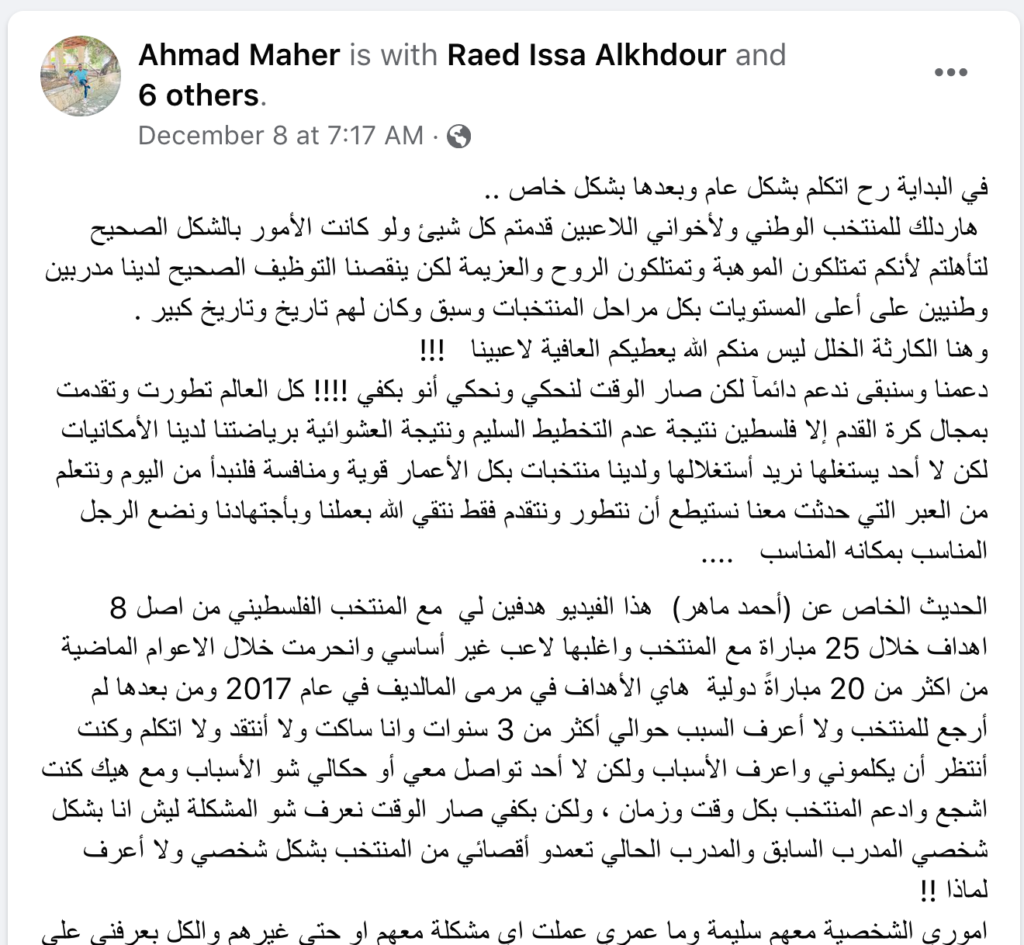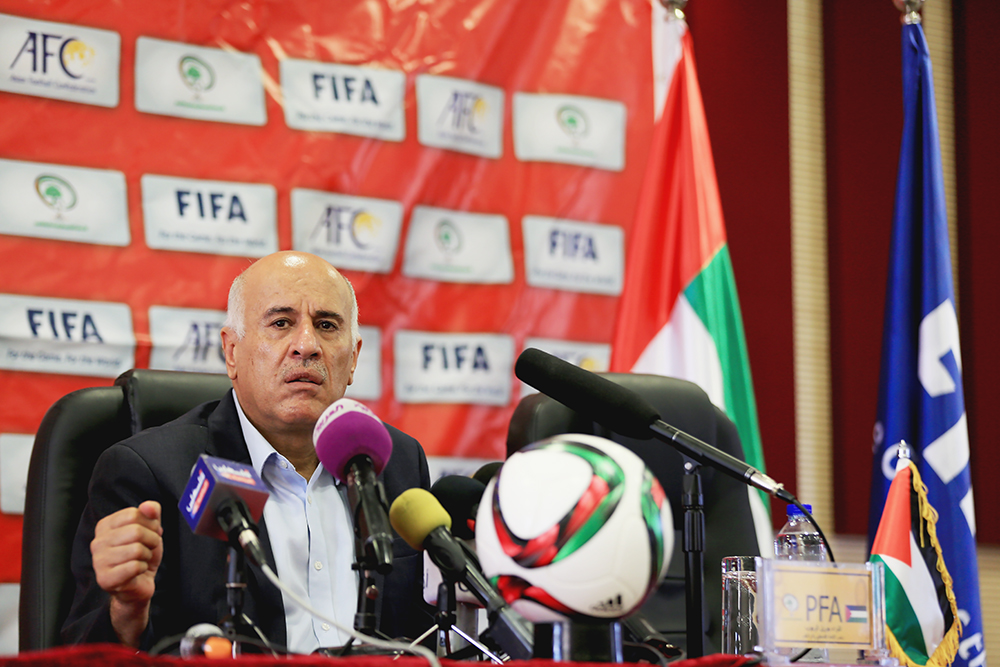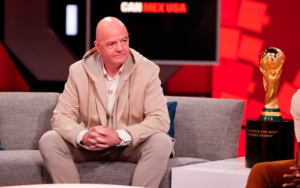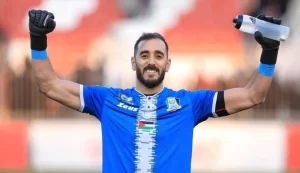Another major tournament, another major failure for Palestine. The past seven years can be characterized, as Charles Dickens once put it, “It was the best of times, it was the worst of times”.
Palestinian football has improved and evolved since joining FIFA in 1998. There were peaks and valleys in its first ten years that culminated with a crash in 2009 as Palestine- ranked 180th at the time- missed the 2011 Asian Cup by failing to even qualify for the 2010 AFC Challenge Cup following draws to Nepal and Kyrgyzstan.
That event- and not the 4-0 drubbing at the hands of Singapore in World Cup qualifying two years earlier- was rock bottom. It did spring the FA into action though. The man in charge of the national team was Ezzat Hamzeh whose salary was being paid by the Jordanian FA.
That disaster brought Moussa Bezzaz- who didn’t set the world alight- but brought a sense of professionalism and stability to the team. The winless streak stretching back to Palestine’s 4-0 win over Cambodia in April 2006 continued. It was at 15 games (3 years and 4 months) when Bezzaz took over in July 2009 and would continue for another 7 games (1 year, 8 months) before finally recording a win against Bangladesh in 2012 AFC Challenge Cup qualifying en route to a successful qualification.
Bezzaz nearly got the side past the first two rounds of playoffs and into the first group stage but the team fell short against Thailand.
The PFA relieved the Franco-Algerian of his duties but didn’t really have a succession plan in place. Two different interim managers (one of them a young Abdel Nasser Barakat) led the team in friendlies where they were decimated. First by Indonesia (4-1) and then by Iran (7-0).
This, once again, spurred action. Jamal Mahmoud was hired and the slow climb up the FIFA Rankings was charted from 164th to 88th when he left the post three years later.
Jamal Mahmoud and the PFA famously fell out, which led to the team performing horribly under an inexperienced manager at the 2015 Asian Cup.
The team found its feet in the aftermath going on a 10-game unbeaten streak capped off by winning all their games in 2017 only for friendly fire from the PFA to stop that progress. An inexperienced manager wasted a golden generation of talent at the 2019 Asian Cup and stayed on to torpedo their chances at reaching the Third Round of World Cup qualifying.
No Manager can succeed in this environment
A lot of anger during the 2021 FIFA Arab Cup was directed at the manager and at some of the players. I will address some of that criticism but first let us make things clear. No manager can succeed without the support of his federation. That support must come through in the shape of deserved bonuses/per diems/salaries being paid and being paid on time. Not just to the manager but to his players as well.
Even more importantly is the work that needs to be done in developing and supporting the sport so that the manager can have a large group of local players ready to make the jump to the national team.
Finally, managers need friendlies to test out ideas and players especially before a big tournament.
Makram Dabboub had none of this and so any criticism should address these issues because no manager has a magic wand that can change teams in a single stroke.
The more alarming issue at play is all the corruption that is taking place within the PFA and Palestinian sport. Quds Network reported earlier this week that the Ministry for Youth and Sport which Jibril Rajoub also heads has spent an astronomical $70 million in the first 10 months of 2021 alone. They also employ 158 people (25 General Managers, 59 ‘A’ Managers, 20 ‘B’ Managers, and 54 ‘C’ managers).
There is money, the problem is that it is being siphoned away from the team.
During the 2019 Asian Cup, the players had negotiated per diems totaling $1,500 for the total time spent before and during the tournament. When the team touched down in the United Arab Emirates they were warmly welcomed by the Palestinian expatriate community who gifted them iPhone X. The PFA sensing an opportunity distributed the phones and claimed it to have brought them this ‘gift’ in lieu of the per diems they were due.
The PFA, thanks to the players, has made millions following successive qualifications to the Asian Cup and their qualification to the Arab Cup. The latter of which netted them $750,000. To this day, the players have not been paid their bonuses for qualifying.
Other national teams in the region pay their players for every appearance and more when the team delivers a win. In spite of all these problems, the players show up and put it all on the line.
If you think the players don’t care, just look at the roller coaster of emotions Mohammed Rashid experienced this past week.
The criticism I will levy against the coach and players later on should be put into this context.
Getting to the knockout stage of the Arab Cup was always going to be a tall task and without any friendlies in October or November (Jordan had four). Adnan Hamed has been in charge of Jordan for four months less than Makram Dabboub and he is more tenured in terms of matches played (9 vs. 8). If you’re wondering why Jordan, Oman, UAE, and Qatar are in the quarterfinals it is simply because they are the best run FAs in West Asia and have had the sort of sustained success over the past decade that comes as a result of planning- prioritizing the players and the sport above all else.
Questionable squad selection
Going into this tournament, Palestine knew full well that many of their key players in attack would not be able to attend due to club commitments. We also knew that Abdallah Jaber is now persona non grata because he dared to stand up to Jibril Rajoub and so he along with Shehab Qombor (a fear of flying) would not be on that plane to Doha.
These are less than ideal circumstances but things you can plan for and in picking a 23 man squad you want to make sure you have a replacement for each player in every position.
When the initial squad came out, I praised Makram Dabboub for making the difficult choice of casting aside Toufic Ali, the boy he turned into Palestine’s #1. I also gave him credit for excluding Khaled Salem and Sameh Maraaba. With the knowledge that Musab Al-Battat would play 270 minutes at the group stage, Musa Farawi’s exclusion didn’t seem like a big talking point.
The moment Musab Al-Battat was diagnosed with COVID-19, Musa Farwi should have been called up. Instead Khaled Salem was called in and proceeded to start two games.
Palestine never once used all five substitutions at the Arab Cup- perhaps a damning indictment of the quality available on the bench but also a damning indictment of the squad selection.
I fail to understand why Markam Dabboub brought Musa Salim and Yazan Iwaiwi as there is simply no need for five center backs in any 23 man squad.
Most thought of Abdel Salam Salama as a right back but it is quite clear from anyone who has watched his career that he is a defensive midfielder and all because he has WBPL experience playing RB doesn’t mean he can be one at international level. After flaming out against Morocco, Mohammed Saleh stepped in and did his best but it would have probably been better to use him in his natural position spelling for the two established starters in the side.
Further up the pitch, Makram Dabboub did not use Ali Adawi or Abdelhamid Abuhabib despite the fact that both these players could have been of use while chasing goals against Jordan.
The only member of the front three that can hold his head high after this tournament is Tamer Seyam who had a goal and an assist and would probably have four or five assists if Khaled Salem could finish.
Reebal Dahamshe had a fine tournament considering he is only 19 years old.
The question then become why weren’t other players called up? Palestine has an embarrassment of riches at the forward position. Fadi Zidan did well in the September friendlies against Kyrgyzstan and Bangladesh- certainly better than Khaled Salem- why wasn’t he in the squad?
If Palestine needed more #9 options why not call up national team veterans? The Thai League is on a break and Yasir Islame would have been available. Mohammed Balah could have been brought in as well. Ahmed Awad continues to be frozen out for no particular reason at all.
Not only did all these names miss out on the squad- they weren’t even included in a preliminary 35 man squad. There were some random names on that squad, Pablo Tamburrini’s career has been in freefall since 2018 but Dabboub wanted to call him up despite an abundance of capable midfielders.
Radwan Abukarsh, a 29 year old right back. Mohammed Sammar- who is injured but in the preliminary list. Dawoud Iraqi who did not shine at all while with the U23s also made the expanded squad.
This shows a lack of foresight and planning. Going into tournaments you have to envision scenarios and plan for them and for the third straight tournament, the manager got his selection wrong.
Palestine needed Musa Farawi and they need more attacking options- or at the very least, to be confident in the ones that were there.
Man Management
The most scathing critique of Makram Dabboub? Perhaps that he is associated with the two previous managers and as such some players don’t get a second chance.
There are many that deserve one. The aforementioned Awad as well as the young centreback pair of Michel Termanini (Kazma/Kuwait) and Saado Abdel Salam (Rhodos/Greece) to name a few.
Then there are guys like Ahmed Maher Wridat who was a solid pro enjoying multiple good seasons in the WBPL after trying his hand at playing abroad with HUSA in Morocco and Wehdat in Jordan.
The attacking midfielder is one of the nicest guys I have come across in my time covering the national team. In 2016, when he wasn’t selected to the national team he showed up and supported his teammates from the stands in Dura while they mauled Timor Leste 7-0. He posted this on Facebook account following Palestine’s elimination from the Arab Cup.

27 caps, 8 goals, 1 assist and a veteran of the 2014 AFC Challenge Cup as well as the 2015 Asian Cup- that is Ahmed Maher Wridat’s national team CV. Add to the fact that he has been in fine form at club level- surely someone like this deserves to be kept in the loop as to his status.
Managing a national team requires a soft touch, a lot of the work is psychological and motivational. You must be able to track the performance of 40-50 players and keep them in the loop as to their status with the team. When the tough decision comes to exclude them from the squad the players deserve a phone call from the manager and an explanation as to why they were left out and what they must do to improve.
The fact that Makram Dabboub has ostensibly failed in doing this does not bode well to any future success he hopes to have with the national team.
New Coach?
The knee jerk reaction following failure at a major tournament is to call for a managerial change. The fans have been calling for Makram Dabboub’s head since he was appointed, adjudging him to be too close to Noureddine Ould Ali.
In spite of being Ould Ali’s assistant and having a bizarre preference for some players (Khaled Salem). Makram Dabboub is better than Noureddine Ould Ali. His teams attack and go forward and perhaps if Khaled Salem scores after rounding Yazid Abu Layla then maybe this game finishes differently.
Makram Dabboub has to answer for the errors in squad selection and in-game decisions such as not availing of substitutes until the 80th minute against Jordan.
That said, the fact of the matter is, Makram Dabboub has shown he can beat the types of teams we would come up against in Asian Cup qualifying in June. In his eight game tenure the team has racked up 16 goals. For context, in 33 official games, Noureddine Ould Ali’s sides could only generate 31 goals.
Yemen and Singapore could be lumped with Palestine again in qualification as the teams are in Pot 3 & 4 at the time of writing. All Palestine has to do is finish above two teams of similar caliber and they can punch their ticket to China 2023.
Dabboub has done good work with this side and the results delivered at the tail end of World Cup qualification as well as the Arab Cup play-off should not be ignored or devalued. Perhaps if he were given the type of support his predecessor got, results would have been marginally better.
Yes, as I touched upon earlier, when his star players were ruled out (Wadi, Chihadeh, Dabbagh, Jaber, Hamadi, Al-Battat, Alghoul) he didn’t select the right replacements. If he stays on, the Tunisian manager will need to reassess the makeup of his squad. There can be no future with Khaled Salem and if he did not have the confidence to use Ali Adawi, Abdelhamid Abuhabib, Yazan Iwaiwi, and Musa Salim then they should make way for role players who can contribute.
In a perfect world, Palestine would hire a new coach one with a vision that can transform Palestinian football. This new coach would go out and recruit Palestinians in Europe and the Americas and fuse them with a talented core of players to take the team to the next level.
That said, we do not live in a perfect world. Houcine Ammouta is not going to manage Palestine. Jibril Rajoub is still head of the Palestine Football Association and there is nothing in his track record that shows he can select a manager. In fact, his selection process over the past few years has been to appoint a cheap option that already is part of the staff. We are running out of options and if the choice is sticking with Makram Dabboub or appointing Fahed Attal who has zero experience, then we are better off sticking with the devil we know.




